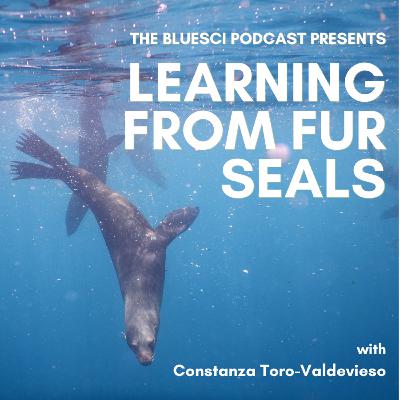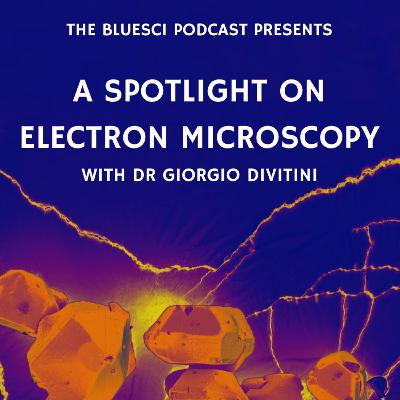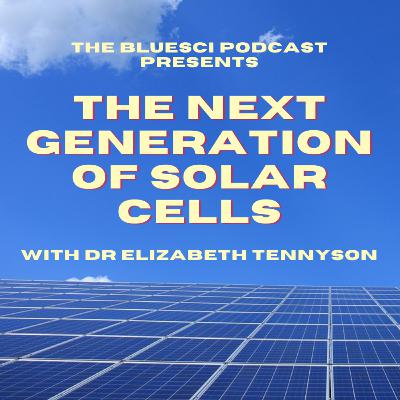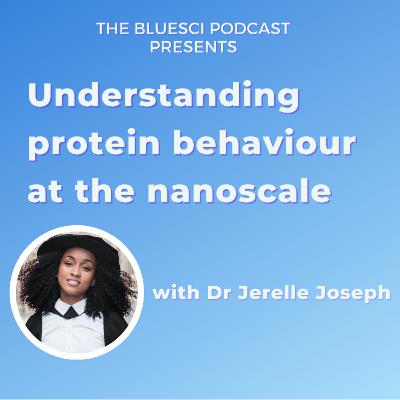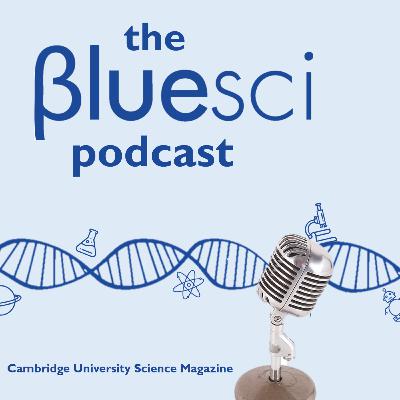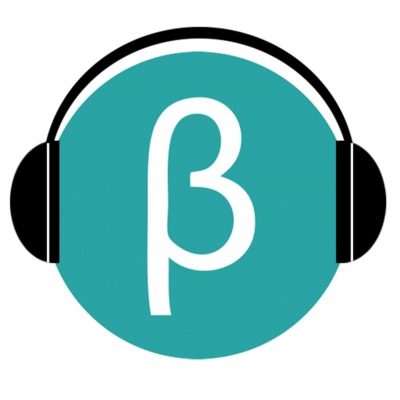Discover BlueSci Podcast
BlueSci Podcast

BlueSci Podcast
Author: Cambridge Uni Science Magazine
Subscribed: 11Played: 73Subscribe
Share
© Cambridge Uni Science Magazine
Description
What's the latest in science these days? How can scientific advances help improve our world? And what's it like to be a scientist, anyway? Every three weeks we delve into the intersections between science, technology, and society, featuring guest researchers who present a fresh perspective on their work, what goes on behind the scenes, and the latest developments in their fields.
Transcripts available: www.bluesci.co.uk/category/podcast/
Brought to you by the Cambridge University Science Magazine.
Hosted by Laura Chilver, Mark Grimes and Georgia Nixon.
New episodes every third Monday!
Transcripts available: www.bluesci.co.uk/category/podcast/
Brought to you by the Cambridge University Science Magazine.
Hosted by Laura Chilver, Mark Grimes and Georgia Nixon.
New episodes every third Monday!
47 Episodes
Reverse
We're back back back! Tune in to find out more about our latest news, we hope you're as excited as we are about our ever-expanding team! In this season launch episode we introduce Georgia Nixon, Mark Grimes and Laura Chilver, who will be joining familiar voices Ruby Coates and Simone Eizagirre to bring you an exciting new season. Make sure to subscribe and follow so you don't miss our first episode coming out next week!
The BlueSci Podcast is run by the Cambridge University Science Magazine, and is sponsored by Greiner Bio-One and Nature Careers. Visit www.bluesci.co.uk to access our free magazine, and find out how to get involved. If you enjoyed this episode, please subscribe and leave a review or rating! We welcome your feedback and suggestions via email: podcast(at)bluesci.co.uk. You can also follow us on Twitter on @bluescipod.
This week we spoke to Amelia Drew a junior research fellow at Homerton College, who has just completed her PhD in Cosmology in the Department of Applied Mathematics and Theoretical Physics. We discuss how the discovery of gravitational waves could allow the detection of phenomena from the early universe such as cosmic strings, which formed the basis of Amelia's PhD research. Amelia also tells us what it's like to work in the world of theoretical cosmology, the implications of cosmological research and what cosmologists hope to understand about the universe in the future.
The BlueSci Podcast is run by the Cambridge University Science Magazine, currently hosted by Ruby Coates and Simone Eizagirre and sponsored by Greiner Bio-One and Nature Careers. Visit www.bluesci.co.uk to access our free magazine, and find out how to get involved. If you enjoyed this episode, please subscribe and leave a review or rating! We welcome your feedback and suggestions via email: podcast(at)bluesci.co.uk. You can also follow us on Twitter on @bluescipod.
Constanza Toro-Valdivieso is a PhD student in the Department of Vetenary Medicine at the University of Cambridge. She studies Juan Fernández fur seals in Chile, focusing on how their gut microbiome can be used as an indicator for wildlife health, and provide a non-invasive way to monitor changes in habitat, food networks, and genetic diversity.
The BlueSci Podcast is run by the Cambridge University Science Magazine, currently hosted by Ruby Coates and Simone Eizagirre and sponsored by Greiner Bio-One and Nature Careers. Visit www.bluesci.co.uk to access our free magazine, and find out how to get involved. If you enjoyed this episode, please subscribe and leave a review or rating! We welcome your feedback and suggestions via email: podcast(at)bluesci.co.uk. You can also follow us on Twitter on @bluescipod.
In this episode we speak to Kobi Felton, a PhD student in the Department of Chemical Engineering and Biotechnology. As part of the Sustainable Reaction Engineering group, Kobi's research focuses on the design and optimisation of chemical reactions using software development and machine-based learning approaches. We chat about how applying data science techniques to chemistry problems is useful for industry, sustainability, and the development of new materials and technologies. He also tells us what it's like to be working on bringing together concepts from such different fields, and how open-access mentality is changing collaborations between researchers and industry.
You can find out more about Kobi's research at kobifelton.com, GitHub and Twitter.
The BlueSci Podcast is run by the Cambridge University Science Magazine, currently hosted by Ruby Coates and Simone Eizagirre and sponsored by Greiner Bio-One and Nature Careers. Visit www.bluesci.co.uk to access our free magazine, and find out how to get involved. If you enjoyed this episode, please subscribe and leave a review or rating! We welcome your feedback and suggestions via email: podcast(at)bluesci.co.uk. You can also follow us on Twitter on @bluescipod.
This week we talk to Cynthia Okoye and Sandile Mtetwa, PhD students at the University of Cambridge. Sandile and Cynthia are two of the founders of Africans in STEM, a student-run initiative that provides a platform and a community for Africans across STEM disciplines to network, collaborate and share ideas - both locally and globally. Recently, to mark Black History Month, the initiative has held an exhibition online and in departments at the University of Cambridge showcasing Black scientists from around the world, as well as a panel discussion spotlighting Black female scientist in Cambridge. In this episode, we learn about Sandile and Cynthia's research, how Africans in STEM was founded, the impact that their activism has had so far, and their hopes and goals for the future.
You can learn more about Africans in STEM here: https://www.africansinstem.co.uk/
You can also view the Africans in STEM exhibition here: https://www.africansinstem.co.uk/bhm-exhibition.html
You can find Africans in STEM on Twitter at @africansinstem
The BlueSci Podcast is run by the Cambridge University Science Magazine, currently hosted by Ruby Coates and Simone Eizagirre and sponsored by Greiner Bio-One and Nature Careers. Visit www.bluesci.co.uk to access our free magazine, and find out how to get involved. If you enjoyed this episode, please subscribe! We welcome your feedback and suggestions via email: podcast(at)bluesci.co.uk. You can also follow us on Twitter on @bluescipod.
This week we speak to Dr Giorgio Divitini, the Advanced TEM Officer in the High Resolution Electron Microscopy Group in the Department of Materials Science & Metallurgy at the University of Cambridge. Giorgio tells us about the background, history and science of electron microscopy, as well as the incredible architectural processes that must take place before setting up an electron microscope facility. We also learn about the vast applications of electron microscopy, all the way from biology to engineering, and find out how this often overlooked technology is likely to evolve in the future.
The image used for the promotional art was taken by Giorgio, and you can find more amazing electron micrographs on his Flickr site: https://www.flickr.com/photos/giorgiodivitini/albums/72157633723329562.
The BlueSci Podcast is run by the Cambridge University Science Magazine, currently hosted by Ruby Coates and Simone Eizagirre and sponsored by Greiner Bio-One. Visit www.bluesci.co.uk to access our free magazine, and find out how to get involved. If you enjoyed this episode, please subscribe! We welcome your feedback and suggestions via email: podcast(at)bluesci.co.uk. You can also follow us on Twitter on @bluescipod.
This week we speak to Dr Elizabeth Tennyson, postdoctoral researcher and Marie Sklodowska-Curie Actions Fellow at the Cavendish Laboratory. Earlier this year, she was named one of the Top 50 Women in Engineering by the Women's Engineering Society for her work on sustainability. She works on a new class of materials called perovskites, which in the last decade or so have become incredibly exciting for applications in solar cells. She tell us about her research using optical microscopy techniques to understand these materials, how she ended up working in renewable energy, and what it’s like working in such a fast-paced and hyped-up field. She also shares her experiences translating research from the lab to real-world applications, specifically from her role in the Affordable Perovskite Solar Irrigations Systems project for small-holder farmers in Ethiopia. You can find Beth at @beth_tennyson on Twitter.
The BlueSci Podcast is run by the Cambridge University Science Magazine, currently hosted by Ruby Coates and Simone Eizagirre and sponsored by Greiner Bio-One. Visit www.bluesci.co.uk to access our free magazine, and find out how to get involved. If you enjoyed this episode, please subscribe! We welcome your feedback and suggestions via email: podcast(at)bluesci.co.uk. You can also follow us on Twitter on @bluescipod.
Welcome back to the BlueSci Podcast! We are fresh from our summer break and have a lot of new exciting science to share!
This week our guest is Dr Jerelle Joseph, a post-doc in the Cavendish Laboratory at the University of Cambridge. Jerelle completed her PhD in atomistic protein modelling and is now doing post-doc studying intracellular liquid-liquid phase separation. She talks to us about how understanding protein biochemistry at a single protein level as well as a multi-protein level is crucial for biomedical research.
Jerelle also talks to us about the CariScholar organisation, a mentorship initiative she founded in order to link Caribbean students to academics and professionals worldwide.
Details on CariScholar can be found here: https://www.carischolar.com/
The BlueSci Podcast is run by the Cambridge University Science Magazine, currently hosted by Ruby Coates and Simone Eizagirre and sponsored by Greiner Bio-One. Visit www.bluesci.co.uk to access our free magazine, and find out how to get involved. If you enjoyed this episode, please subscribe! We welcome your feedback and suggestions via email: podcast(at)bluesci.co.uk. You can also follow us on Twitter on @bluescipod.
In this week's episode it's just your hosts, Ruby and Simone! We thought we’d use this episode to share some of the things that we’ve been up to as part of our work as the hosts of the podcast, and make some announcements.
Firstly, we share our thoughts following our podcast collaboration with Simone Erlingfeld from Cambridge Quaranchats, a humanities-based podcast. In this 2-episode collaboration, we discussed some of the best fragments from both of our podcasts, and explored how each connected to both the sciences and humanities. We also talked about how politics and ethics affect scientific research, and how society's perception and understanding of science can help inform policymaking and encourage positive change. Make sure to check these episodes out!
Secondly, we are going to take a short break from the podcast to refresh and plan more episodes for you to enjoy! In the meantime - please get in contact us with any questions, comments or suggestions for the podcast on Twitter (@bluescipod) or email (podcast@bluesci.co.uk). Do you know someone we should interview? Do you want us to interview you? Let us know!
See you in August!
Listen to the podcast with Cambridge Quaranchats on your favourite digital platform, via: https://anchor.fm/quaranchats/episodes/18--Pandemic-Partners-Sciences--Humanities-link-up--wBlueSci-Pod-part-1-egi7dv
For today's episode we've invited PhD students Daniel Muthukrishna and Nick Taylor to tell us about a COVID-19 modelling web-app they made in collaboration with Dr Cerian Webb. The website, called lowhighcovid, is an educational resource which allows users to learn about mathematical modelling and infectious disease statistics, interactively set and observe the outcomes of control measures, and visualise COVID-19 data in real time from a global data feed.
Dan (Astrophysics) and Nick (Plant Epidemiology) tell us how they came up with the idea for the app whilst having a drink at their college bar, and how it evolved into the resource it is today. They explain what it takes to build an interactive modelling app from scratch and what they have learned along the way.
You can find the lowhighcovid app here and take a look for yourself: https://lowhighcovid.herokuapp.com/
The BlueSci Podcast is run by the Cambridge University Science Magazine, currently hosted by Ruby Coates and Simone Eizagirre and sponsored by Greiner Bio-One. Visit www.bluesci.co.uk to access our free magazine, and find out how to get involved. If you enjoyed this episode, please subscribe! We welcome your feedback and suggestions via email: podcast (at) bluesci (dot) co (dot) uk. You can also follow us on Twitter on @bluescipod.
Our first episode recorded in self-isolation, focusing on the research of one of our co-hosts, Ruby Coates! She is a molecular biologist and her PhD focuses on Campylobacter jejuni, a nasty but resilient stomach bug on the World Health Organisations' watchlist. We also discuss the challenges of working from home as a lab-based researcher, how the pandemic affects us all, and its impact on those undertaking PhDs. Stay at home and listen to some podcasts!
The BlueSci Podcast is run by the Cambridge University Science Magazine, currently hosted by Ruby Coates and Simone Eizagirre. Visit www.bluesci.co.uk to access our free magazine, and find out how to get involved. If you enjoyed this episode, please subscribe! We welcome your feedback and suggestions via email: bluescipodcast (at) gmail (dot) com.
In this week's episode, archaeology meets parasites! We speak to Marissa Ledger, a PhD student (now Dr!) in Biological Anthropology at the University of Cambridge, who tells us how identification of parasite eggs found in ancient latrines, cesspits and human remains can tell us what ancient civilisations ate, how they lived and where they travelled.
The BlueSci Podcast is run by the Cambridge University Science Magazine, currently hosted by Ruby Coates and Simone Eizagirre. Visit www.bluesci.co.uk to access our free magazine, and find out how to get involved. If you enjoyed this episode, why not subscribe? We welcome your feedback and suggestions via email: bluescipodcast (at) gmail (dot) com.
Research at universities plays an important role in the development of new technology that can fight climate change, whether it's making better batteries, carbon capture systems, or cleaner fuels. But how sustainable are our laboratories? We chat to Martin Howes, coordinator of the Green Labs initiative at Cambridge University, about single-use plastic waste, upcoming net zero targets, and how we can encourage the adoption of more sustainable practices in university laboratories and research institutes.
The BlueSci Podcast is run by the Cambridge University Science Magazine, currently hosted by Ruby Coates and Simone Eizagirre. Visit www.bluesci.co.uk to access our free magazine, and find out how to get involved. If you enjoyed this episode, why not subscribe? We welcome your feedback and suggestions via email: bluescipodcast (at) gmail (dot) com.
First episode of the second season, with new hosts Ruby Coates & Simone Eizagirre! Celebrating the launch of issue 47 of BlueSci, we invite issue editor Laia Sarratosa to walk us through the process of putting together a magazine. We talk about how to get started in science writing, the role that art can play in science communication, and the benefits of getting involved with science journalism as a student. We also catch up with writers Evan Wroe, Felix Opolka, and Hazel Walker about their experiences contributing to the magazine.
Find yourself a shiny free copy of the latest issue of Bluesci Magazine around the Cambridge University Campus or at www.bluesci.co.uk.
SECOND BONUS POD!
The Cambridge Science Festival 2019 is in full swing! Roxy & Emma talk to Hugh Matthews from the Department of Physiology, Development and Neuroscience about his upcoming talk on how to trick the visual system, and his views on the importance of public engagement with younger audiences. Emma also catches up with Emily Fisk from the Cambridge Science Centre to hear about special activities the Centre is putting on during the Festival!
For more festival details, visit https://www.sciencefestival.cam.ac.uk/
BONUS POD!
To celebrate the Cambridge Science Festival 2019, Emma has a quick chat with Ellen Nisbet and Liz Miller, two speakers at this year's festival, to hear about their upcoming talks, what other events they are looking forward to and why they think it is important to take part in science public engagement.
For more festival details, visit https://www.sciencefestival.cam.ac.uk/
Seán is back! He and Emma talk to Alice Pullen from the British Antarctic Survey and Dr Delphine Larrieu, who works as a Group Leader in the Cambridge Institute for Medical Research (CIMR). They also talk about bees doing maths and Emma makes Seán solve equations.
For the first show of 2019, Emma and new host Swastika bring you two interviews with scientists from the Gurdon Institute. Emma talks to group leader Dr Merixtell Huch, about her work on liver and pancreas progenitor cells. Swasti chats with Khayam Javed, a PhD student in Sir John Gurdon's lab, about his research on cell fate determination in frog embryos and what it is like to study with a Nobel Laureate. They also discuss mosquito dissections and antimalarial drugs!
Emma and new pod host Eva talk to Berta Verd, a postdoctoral researcher from the Department of Genetics and Emily Fisk, who joined the Cambridge Science Centre as a science communicator after a PhD in microbiology. They also chat about a new artificial intelligence technology and its applications for cancer diagnosis.
Seán and Emma (well, mostly Seán) talk to Richard McKay from the Department of History and Philosophy of Science at the University of Cambridge about his book: "Patient Zero and the Making of the AIDS Epidemic". They also have a quick chat with PhD student Christina Gladkova about her paper on the structure of active PARKIN and its implications for understanding early-onset Parkinson's disease.




